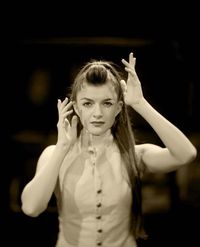Pippin previews start tomorrow
#225Pippin previews start tomorrow
Posted: 4/6/13 at 1:30pmOh...not really a spoiler since every interview she's done has talked about the physical aspect, etc.
#226Pippin previews start tomorrow
Posted: 4/6/13 at 1:51pmWell some people may see it differently and wouldn't appreciate it being ruined for them. I know I would be really annoyed.
#227Pippin previews start tomorrow
Posted: 4/6/13 at 1:53pm
The rolling harpsichord sound on that original album is, I believe, the Rock-Si-Chord, a musical instrument/keyboard voice associated almost entirely with late-60s soft pop and early-70s soft-pop musicals. You can hear it on the original "Company" album as well.
The style on that OBC recording definitely tends towards "quiet and mellow," far more than the show does, or ever did.
Wilmingtom
Broadway Legend Joined: 7/18/11
#228Pippin previews start tomorrow
Posted: 4/6/13 at 2:51pmBlockhead, you might want to avoid preview threads if you don't want to know about a production before seeing it. Just sayin'.
#229Pippin previews start tomorrow
Posted: 4/6/13 at 5:02pmI have seen it. I was thinking of other people but thanks.
#230Pippin previews start tomorrow
Posted: 4/7/13 at 12:20amOh, my gosh, what a wonderful show! Just astounding. I loved every minute!
#231Pippin previews start tomorrow
Posted: 4/7/13 at 12:41amWow! Saw today's matinee. After all these great reviews on this and other threads, I was wondering if the show could possibly live up to the hype. For one of the very few times in my memory, it EXCEEDED the hype. I thought the acrobatics melded perfectly with the Fosse moves. I thought everybody did a great job. And i'm totally in love with Patina Miller! Again, wow! Just go see it!
#232Pippin previews start tomorrow
Posted: 4/7/13 at 9:56am
I've gone 3 times now. Just perfection.
I can't decide who is giving the most unexpectedly delightful performance: Patina Miller or Rachel Bay Jones. My reaction to both I believe is coming from expectations: the former from the notion that Ben Vereen's performance is untouchable and the latter from the fact that Catherine is typically such a thankless, boring, throw-away part. However, both performers are infusing such unique personality into their respective roles while still serving the integrity of the show. I can't say enough wonderful things.
Everyone is stellar and I wouldn't be surprised by Tony nominations for any of the leads in this production.
lenstersf
Stand-by Joined: 6/14/12
#233Pippin previews start tomorrow
Posted: 4/7/13 at 12:54pmI completely agree re: Rachel Bay Jones. She almost single-handedly elevates a chunk of the dreary second act into something charming and enjoyable. I think some might not appreciate her performance since it's not as physically active or showy.
#234Pippin previews start tomorrow
Posted: 4/7/13 at 1:35pm
"I think some might not appreciate her performance since it's not as physically active or showy."
Maybe true for some, but I would argue it is possible to dislike her characterization and mannerisms as Catherine on their own merits. Despite my general distaste for the show, my dislike of her Catherine was a completely separate issue for me and I can imagine a few other actresses doing more with the part than her. Obviously her choices are very stylized though so it comes down to a taste issue.
lenstersf
Stand-by Joined: 6/14/12
#235Pippin previews start tomorrow
Posted: 4/7/13 at 2:01pm^ I'm not very familiar with how other actors have portrayed Catherine. What didn't you like about Jones's characterization?
#236Pippin previews start tomorrow
Posted: 4/7/13 at 3:35pmBrilliant, brilliant and, oh yeah, BRILLIANT!
#237Pippin previews start tomorrow
Posted: 4/7/13 at 5:00pm
Usually after I have seen a show I like to write a long rambling review nitpicking all the bits I like and didn't and come to an overall conclusion and say whether I would recommend it, so here goes:
I liked all of it, I didn't like none of it. Perfect. If you get even half a chance GO AND SEE IT! :P
#238Pippin previews start tomorrow
Posted: 4/7/13 at 6:19pm
"I'm not very familiar with how other actors have portrayed Catherine. What didn't you like about Jones's characterization?"
It's not that I've seen so many Catherines that there are specific portrayals I preferred to Jones. It's that I found her very affected, and not in the intentional "she's acting affected in a meta way until she reaches the sincere part of the play", I just found everything about her to be try-hard and schticky which is a fine choice when it works and when it's funny, but I didn't think she hit the right beats on the comedy and I can't say she made me laugh at all. I never at any point truly cared about what happened to her, so the ending to me was completely unsatisfying. SPOILER I didn't understand why he chose her and her son at the end of the show. I was confused as to what was remotely special to Pippin about their life and she didn't seem appealing or interesting enough to justify his change of heart. I guess that could also be Matthew James Thomas not emoting that change of heart enough as well, but I think part of it was my dislike of her and her character. I wanted so badly to be charmed by her in all her cloying desperate neediness since Catherine is a part that can bring a lot more brightness to the dreary second act and I wasn't at all.
As far as other actresses, I believe I saw a clip somewhere of Laura Benanti performing a song and scene as Catherine that I found much more appealing. Abby Mueller also played her regionally and I would be fascinated to see her take on it, as she's got a natural charisma and a unique sense of humor that I think would play well.
Saying all this, I'm well aware most do find Rachel Bay Jones to be charming, well-cast, and a highlight, just explaining my reasons for disagreeing.
As a side-note, I'm shocked to hear people found D'Amboise to be the weak link. I actually thought she was one of the more entertaining parts of the show and I love watching her dance. She, Andrea, and Patina were the things that kept me watching and actually enjoying pieces of it.
#239Pippin previews start tomorrow
Posted: 4/7/13 at 7:13pmI agree with you about D'Amboise. I thought she was terrific! She really sold the character.
#240Pippin previews start tomorrow
Posted: 4/7/13 at 7:53pm
Kelly2,
I think Laura Benanti would've been a wonderful choice! Here's a clip, was this the one you saw? - she appears about half way through: http://www.youtube.com/watch?v=mPD0Czti-T0
When I saw this production in Cambridge the first time, it was in previews, and I thought the 2nd Act needed work. When I saw it the second time after opening, the 2nd act was overall much better. Also, Charlotte was better the second time as well.
SPOILER ALERT
I think the point about Pippin and Catherine is that towards the end, Pippin starts to realize that being extraordinary is not what you find or do out there, but it has to come from within. He has to bring it. And you're right - Catherine and her son are ordinary, nothing special at first glance. And so it asks - "what are you willing to bring to the table ( or do to be extraordinary)?" Pippin's choice to stay with her gives him the opportunities to "be" extraordinary in an ordinary life. And besides, it's better than sacrificing himself to prove he is extraordinary. I'm sure there are a few other metaphors one could find in there as well.
#241Pippin previews start tomorrow
Posted: 4/7/13 at 9:00pm
HoldThatThought, that's the clip! I would've loved to see Benanti do it, I really found her humor more endearing and I thought she made the irritating qualities of that character feel more like comic relief than like I was actually being irritated, like Bay Jones. Shrug! Just my personal preference.
SPOILER
My issue isn't Catherine and her son being "ordinary", that I totally understand. My issue is I don't understand why he is drawn specifically to her and why he can see such a future with her, when I found her utterly unappealing in every way. There are, undoubtedly, other ordinary people out there. What's his draw to her specifically? What ordinary life does he see with her and her son specifically that changes his mind?
lenstersf
Stand-by Joined: 6/14/12
#242Pippin previews start tomorrow
Posted: 4/7/13 at 10:13pm
Interesting. I personally thought Bay Jones was great, and I felt sorry for her she sang "I Guess I'll Miss the Man," so I guess I had some sort of emotional connection with her.
SPOILER!!
The way I look at it: Catherine is one of the many players designed to guide Pippin towards his extraordinary "grand finale." Pippin isn't really drawn to her at the beginning...she's brought to him by the Leading Player, and he, without knowing it, will inevitably realize that he doesn't want an ordinary life with Catherine (this is all part of the plan). But Catherine knows that she's playing a character that will lead Pippin to this realization (she's played this role before, but for the first time, she actually falls in love). Pippin only realizes that he can be extraordinary in an otherwise ordinary life when he's facing the grand finale...It's hard to say what exactly he sees in Catherine and Theo since it's not explicitly stated, but one can imagine lots of different reasons (e.g, having experienced war, sex, power, etc., he doesn't quite care to be extraordinary anymore; he did care for her and Theo, but didn't think life with them would be extraordinary enough). Pippin is only exposed to this ordinary life once in the musical, so it's kind of his only option at the end (that being said, he's content with his decision, and I'm not sure he realizes there are other ordinary people out there...but this is getting beyond the point). And I think the audience has to be OK with that, too.
#243Pippin previews start tomorrow
Posted: 4/8/13 at 12:01am
I agree with what lenstersf said, and I have another thought to add, re: Catherine.
************************SPOILER ALERT****************************
Every time Pippin is faced with a setback, the Leading Player suggests a new path to take, and Pippin goes for it each time. Catherine is introduced by the Player ("Enter Catherine!"), and she is meant to be Pippin's final step on the road to the finale--the one which ultimately breaks him so he'll consent to killing himself in the ring of fire. The Players have completed this routine with a number of different people (recall that Catherine tells the Leading Player that Pippin touched her, when none of the others have before), successfully resulting in their suicides. In Pippin's case, Catherine truly loves him, and Pippin senses it enough so that he feels he has something to lose. So it's not just that the stakes are higher if "the finale" doesn't work in fulfilling Pippin's need to be extraordinary, it's that he finally has a REASON to go against the Leading Player, because he's found something extraordinary in "ordinary" life that's worth trying.
My favorite moment in the Catherine arc when I saw the show in Cambridge (I've yet to see it on Bway) is when she says "Ta-Daaa!" after making the quince pie flambe. Every other time we hear "Ta-Daaa!" from the Players, it's after they have performed amazing physical feats. But Catherine makes the ordinary extraordinary in itself: the Players' acrobatics represent Pippin's fantasy version of what it means to be "extraordinary," and it's an unrealistic ideal for him to strive for. But the REAL extraordinary is having someone to come home to who cares enough about you to surprise you with homemade cooking--and even though it doesn't get Pippin what he thought he wanted at the beginning of the show, it's worth living for.
Rachel Bay Jones brings a true charm and depth to the character with her quirky line readings, her conflicted reactions to the Leading Player's abuse, and of course, her beautiful performances of potentially insipid material. For the first time in several productions of "Pippin" that I've seen, I actually bought that Pippin found something in Catherine worth LIVING for, as opposed to something that's only marginally better than death by fire.
#245Pippin previews start tomorrow
Posted: 4/8/13 at 12:16am
Thanks, WickedRocks! btw, did I say I wanted to add "a thought?" I meant, "I have to write an ESSAY about this now."
Seriously, this show has gotten into my skull and I don't think it'll leave until I spin the cast recording in my car for a couple weeks. I didn't much care for the show before seeing this production, but it changed my whole perspective on the intentions and value of the show. :)
#246Pippin previews start tomorrow
Posted: 4/8/13 at 9:47am
I love you, LuminousBeing. Let's get on the floor and sing Love Song.
Please share more of your thoughts. Such as...
*SPOILER*
Do you see Pippin as a metaphor? As if the Players are the demons inside our heads?
#247Pippin previews start tomorrow
Posted: 4/8/13 at 9:59amLumoniousBeing, I like that explanation and I buy that as far as what the show was intending, I just don't think Bay Jones conveys anything you're describing in her performance. Different strokes.
#248Pippin previews start tomorrow
Posted: 4/8/13 at 11:20am
J52 - La la la la la la la la la la!
**********************LOTS OF SPOILERS***************************
Do you see Pippin as a metaphor? As if the Players are the demons inside our heads?
Okay, you asked for my thoughts? Let's hope this post won't be more than you bargained for!
First off, let me just say that I DON'T think that the book or score of "Pippin" are completely successful in backing up the theories I'm about to present. What follows are thoughts regarding the INTENTIONS of the book and some of the score, as I believe Fosse (not Schwartz) imagined it, and that I believe this production emphasizes.
I'll answer your question first: yes, I do believe that the intention of the show is that the Players represent the suicidal impulses in any person who feels unfulfilled--even those who, like Pippin, have accomplished a great deal (he was Scholar of the House before beginning this dark journey).
Having gone through a similar period to Pippin when I finished college, I can relate to 22-year-old Pippin's being deceived by the self-talk that leads him to believe that nothing he does is giving or ever will give him an extraordinary existence. What Pippin doesn't understand at 22 years old is that it's not a career path or resume that makes you extraordinary: it's being given ordinary circumstances and bringing the extraordinary to them. But that's a LOT more challenging, and requires a LOT more personal growth, energy, and commitment, than engaging in a guess-and-check method of exploring, hoping that plunging himself into different environments will eventually bring him happiness and meaning.
With regard to Catherine: she's initially one of the metaphorical "demons" led by the Leading Player, and meant to be Pippin's last line of defense. Pippin has tried literally every kind of life and engaged in literally every adventure possible on earth (in his mind), so why not try "what everyone else does," i.e. having a relationship a family. The Leading Player, who represents our inner demons, is hoping that the "ordinary" life will prime him for the Finale - suicide - because it will give him just enough of a boost to give him the motivation to go through with it.
But Catherine is different than the rest of the Players. She is actually leading an "extraordinary" life as a member of the Players: she's constantly surrounded by their feats. However, despite being "extraordinary," she's quite unhappy, and is looking for something, or someone, to escape to. She's still kept on a short leash by the Leading Player, who has to admonish her to make Pippin miserable when she slips into patterns that could save Pippin, not drive him away ("you're supposed to read the line NAGGINGLY!")
Being the oldest member of the troupe (the Leading Player makes CONSTANT references to her being too old for the role, that she's going to be replaced, etc.), she has the wisdom and experience to understand that suicide is NOT glorious. It doesn't make people extraordinary: it just makes people dead. Up until Pippin, Catherine had succumbed to the Leading Player's abuses and helped with his master plans, the price of disobedience being expulsion. When she meets Pippin, she is at a point where she's ready to leave the extraordinary environment she's in and lead an ordinary life, just as Pippin becomes ready to leave his fantasy world, abandon his unrealistic ambition, and lead an ordinary life with her. In "I Guess I'll Miss the Man," Catherine opines that Pippin was far from perfect, not remotely a storybook love story, but that he's a huge improvement from her past time spent with the Players and whatever other men she's been with--enough so that she's ready to commit to him. (Like I mentioned in my previous post, Pippin finally sees a life worth living for in Catherine as opposed to just a life that's slightly better than death: Catherine, too, sees in Pippin something worth leaving the Players for, not just something that's slightly better than continuing to be abused by the Leading Player and coaxing innocent people to their deaths.)
I believe that the overall intention of the show is to demonstrate that we are constantly being barraged by an inner self-talk ("Why, we're inside ALL your heads!") that attempts to convince us that we're not good-looking enough, not smart enough, not accomplished enough, not ambitious enough, NOT EXTRAORDINARY IN ANY WAY, and wouldn't it be better to just give it up as a bad job and at least go out in a blaze of glory? But the show disagrees with the self-talk, stating that an extraordinary life can be found in ordinary circumstances, if you're lucky enough to find that "wonderful girl/boy" and be wise enough to commit to making that partner's life extraordinary.
But, as the very end of this production also illustrates, that self-talk starts very young, and it can well be a lifelong battle.
broadway guy
Broadway Legend Joined: 8/5/11
#249Pippin previews start tomorrow
Posted: 4/8/13 at 11:24amFor people who have seen the show, what circus acts are being performed? and how is it being done? I won't be seeing this show live for a very long time and i am dying to know how they are incorporating the circus. Thanks
Videos











